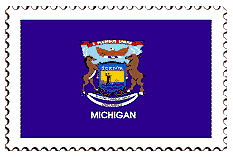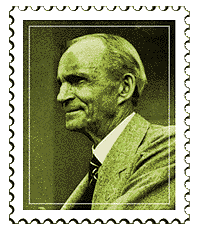
State Flower:
Apple Blossom

State Bird:
Robin

State Tree:
White Pine

State Flag:
Michigan's flag shows the state shield with three mottoes: "Tuebor," which means "I Will Defend," "E Pluribus Unum" (the national motto) meaning "One Out of Many," and the state motto, "Si Quaeris Peninsulam Amoenam Circumspice" which means, "If You Seek a Pleasant Peninsula, Look About You." The man standing on the peninsula has his right hand raised in peace and a gun in the left hand to signify "I will defend." The eagle represents the United States and the elk and moose represent Michigan.

Famous Person:
Henry Ford
"Anything that isn't good for everybody, is no good at all."
Born on a farm in Dearborn on July 30, 1863, the young Henry Ford despised farming, but loved farm machinery. At a very early age he showed a natural aptitude for mechanics, and as a boy would take apart anything mechanical for the mere joy of putting it back together again. As he recalled in later years, "Every clock in the house shuddered when it saw me coming." At 15 he ran away from home to apprentice with a local machinist and feed his hunger for knowledge about machines. Later, he returned to his farm and set up a small machine shop where he built his first automobile in 1892. In 1899 he formed the Detroit Automobile Company and in 1903 the Ford Motor Company. He was the first industrialist to introduce assembly-line manufacturing to efficiently build cars for the masses. This single act transformed the automobile from a toy for the rich into a tool for middle class. In fact his best customers were his own workers. Ford believed that if he paid his workers well he could do three things: get the best workers, avoid labor unions and build a customer base for his own products. When Ford introduced the $5 wage in 1914 -- an unheard of salary back then -- he was labeled a traitor by other capitalists. But his company profited $30 million, $20 million, and $60 million in the first three years since the new wage was introduced, making Ford a very rich and powerful man.